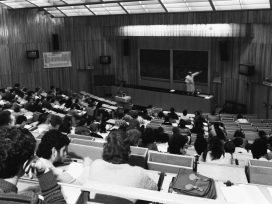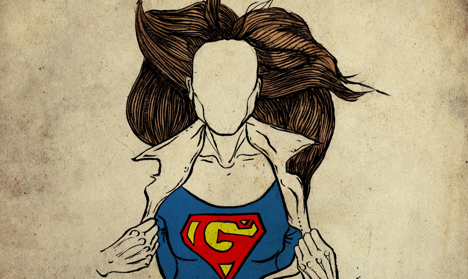
Expectations, standards, and requirements in higher education vary from country to country. In the third episode of the Knowledgeable Youth podcast Ukrainian students embark on the complex subject of tertiary education.
The Roman Catholic Church in Poland is not merely scaremongering about gender: it wishes to seriously reflect upon the topic, insists Marcin Nowak. And despite the potential of every idea, including liberalism and Christianity, to become an ideology, serious dialogue will follow.
Tomasz Sawczuk: It does not happen very often that an obscure academic term becomes the subject of a lively public debate. Why is the Roman Catholic Church so involved in the criticism of gender?

Photo: Magdalena Marcinkowska
Marcin Nowak: They key to understanding the Church’s stance is being able to differentiate between “gender” and “gender ideology”. Gender is like a lens that gathers numerous issues regarding important assumptions that refer to who we are as people. The Church, following a particular anthropology of man, sees some sort of danger in “gender ideology”. But not in gender itself. In your question, you were probably referring to the letter from Polish bishops highlighting gender as a phenomenon.1 We might like or dislike the form of this intervention. Form aside, however, if we get to the bottom of what the Church is saying, we will arrive at a premise that gender, just like any other idea, like liberalism or conservatism, and also like wrongly understood Christianity, has the potential to become an ideology. The Church was stressing the dangers of gender becoming an ideology.
TS: As you point out, the potential to become an ideology is relevant in many different circumstances. Could you give me any significant reasons as to why gender became the term we have all been hearing in the last weeks?
MN: Human identity will be the most vital social issue of the twenty-first century. Many thinkers have univocally expressed this view. In spite of appearances, the discussion over gender is a sign of how slow Poland has been in entering onto the world stage of public debate. The West has already gone through its discussion on cultural gender roles. In Poland, the emotions related to gender are like a litmus test showing that we too are beginning to talk about one of the most important and contemporary social issues. This is the reason why I am not surprised that this discussion on such vital issues, this juxtaposition of two anthropologies, two concepts of the human being, is so lively.
TS: According to the Church, what is the core of the problem here?
MN: In his recent apostolic exhortation “Evangelii Gaudium”, Pope Francis clearly states that “demands that the legitimate rights of women be respected, based on the firm conviction that men and women are equal in dignity, present the Church with profound and challenging questions which cannot be lightly evaded”. This is the very essence of the matter. The question of women’s dignity is a bridge between people who belong to the Catholic Church and people who deal with gender issues. Both the exhortation and the recent issue of the Roman Catholic weekly Tygodnik Powszechny, which featured the opinions of Catholic thinkers like Fr. Maciej Zieba, clearly show that the Church believes that the issue of women’s dignity should be discussed and rethought anew. After all, Jesus’ teachings in terms of attitudes to women were revolutionary.
TS: But this is a very mild version of matters as they stand. It would seem that the current debate, even with regard to the emphasis on women’s rights, has potentially dangerous consequences. Some members of the clergy have claimed that gender is the new Marxism. Where do these fears stem from?
MN: The reason is very simple. The Church has had a very conflicted historical experience of Marxism, particularly in Poland. And so, when faced with the issue of gender, the Church applies a conceptual framework that it is very familiar with due to its past experiences. Is this the right diagnosis and methodology? We can disagree, of course, but I find it very interesting and definitely worth paying some more attention to. We could also look at this problem from the perspective of Mannheim’s Ideology and Utopia or Kolakowski’s Main Currents of Marxism. And we would notice that any notion, including gender, is multifaceted, multidimensional, and that on the sociological level, gender is rooted in thought originating from Marxist concepts. Of course this is only one possible option, but it can be traced in gender. So perhaps the Church is not only scaremongering about gender, but would also like to seriously consider important aspects of this phenomenon.
TS: We started our conversation by saying that gender was not a widespread idea. So searching for Marxist roots in something that is not very widespread is a process that is fairly difficult to grasp. You can only presume that this is about a recommendation to reject gender without giving it too much thought, if the question ever even comes up.
MN: This accusation per se is not the most important. Pope Francis said he knew many decent Marxists. We too have a history of discourse in Poland between a number of esteemed Marxists and Catholic thinkers. The history of the Church, its modern history in particular, shows that this dialogue has often been extremely fruitful. In fact, the basic premise of this issue is the question of what man is. Is man a being that is self-created through self-definition, does man have the power to choose, to create his own identity? The Church cannot agree with this. Man is self-created, but he is also created by values, his relationship with God and other human beings. And it seems that the Church is beginning to increasingly emphasize this idea.
TS: But the idea that man creates his own identity is not specific only to gender. It is also present in other contexts. So perhaps the Church’s mistake lies in the fact that instead of discussing this problem in more depth, it focuses too much on sexuality?
MN: The Church speaks mostly of salvation and is involved in the preaching of the Gospel. Of course, you can sometimes get the impression that the Church speaks a lot about sex and the body, but I think this is not because it has a sex and body complex. This comes from Christian anthropology, which, in spite of appearances, is very carnal and very solid, as it stems from Judaism.
TS: But you can speak of violence, of alcoholism and of poverty, and instead it seems that the Church constantly speaks of the body and sex.
MN: Personally, I do not get the impression that sex is particularly present in what the Church says. Love is at the heart of it all, and, true, the aspect of the body is a part of it. But it is worth remembering that Christianity links Eros, as well as Agape and Caritas. This is where the focus on human sexuality comes from. The body and sex is the space in which all other aspects converge. Of course, we could view the problem through conflict theories, the theory of power or Michel Foucault’s biopolitics, and assume that the Church wants to keep its hand on the most crucial point, which concerns everybody, and, through this, exercise control and power. For me, though, a more interesting perspective, which is also closer to the truth, is one that assumes that the Church speaks of sex and the body because it knows exactly what a delicate and intimate sphere this is. Is it good to talk about this sphere only through the prism of orders and bans? I don’t think so. Actually, this is also reflected in Pope Francis’ distribution of emphasis. This is the way in which the Church points to the issues it finds very important. We, people living in the modern world, have an issue with the body, as was illustrated quite well by Zygmunt Bauman. You can also reverse the question: if such prominent intellectuals and thinkers, who have a good feeling for a society, also strongly touch on the issue of the body, then perhaps it is a real social problem? And so it shouldn’t surprise us that the Church is trying to voice its opinion on the matter. This is why the body and sexuality are so crucial. Not because the Church is trying to take control, but because it realizes that the body and sexuality are the key to the most intimate and crucial aspects being human. The well-being of a community depends on this key.
TS: So the number of norms in terms of sexuality is an important factor in shaping social life as a whole? This is a rather far-fetched argument.
MN: I feel very close to de Tocqueville’s idea of society, which strongly emphasizes “habits of the heart”, the culture that has a tangible influence on the life of a community through values that are important in this community, values that work… If we agree this is an interesting approach, that the “soft” phenomena of social life are crucial, then everything seems to fall into place. Existing norms and values are not neutral to social life as a whole.
The trouble is that the way in which the Church approaches this issue is not an invitation to dialogue, but rather the closure of a discussion. We are lectured on how things really are, presented with a serious threat to culture, which is thinking about man from the perspective of gender, and there is no room left for any doubt. This leads to a “besieged fortress” situation. Why?
MN: This is a very good question. Indeed, perhaps the form should be different. It should be an invitation to a conversation, to a degree in the spirit described by Pope Francis in his most recent exhortation. The Church has a rich tradition of pointing to social problems without stigmatizing people who identify themselves with particular views or phenomena.
TS: But what is the reason for this? Let’s make a hypothesis: we all see that Polish society is becoming increasingly secular, much the same as western societies. Perhaps the Church hierarchs fear that if they enter an open discussion that involves secular ethics, they will find themselves in a weaker position. So they prefer to “stay in their own garden”, because they believe this is the only way to retain a religious form of life within society. If we take up a dialogue, we also must agree to some concessions.
MN: I don’t think that the language of conflict or power struggle is the kind of language that would allow us a deeper understanding of what the gender discussion is. I’m interested in a much deeper issue here. Our identity comprises of the body and gender (sex), including the cultural definition of gender (sex). This is a huge area to discuss: how the definition of gender (sex) changes, what the male identity crisis in the modern world is about, how the concept of a family and women’s roles change…
TS: Can we count on this kind of discussion in a more serious form?
MN: In the nineteenth century there were workers’ issues. By analogy, the first reaction of the Church was: Marxism is bad. Only later did Pope Leo XIII deal with this problem and many interesting ideas were brought forward. This was the same with feminism – the Church, having initially criticized it, started to look into it by speaking of the need to restore women’s dignity. It is quite possible that gender will follow the same pattern. After the first alarmist, negative and “puffed-up” reactions, which can appear stigmatizing and look like scaremongering, reflection will come. The history of the Church shows that this has happened many times before. Later, we will work on common areas, where we will be able to meet and define what connects us, and what divides us. This shared area is, above all, human dignity. Saint Paul said that in Christ there is neither a man nor a woman, neither a slave nor a free person. Understanding these words is a challenge to us all. And, in conclusion, in many Church communities, both lay and clerical, there is the willingness to meet and enter into dialogue. This allows us to look towards the future with optimism.
In December 2013, the Catholic Bishops Conference of Poland posted online a pastoral letter entitled "Threats to the family stemming from gender ideology".
Published 28 March 2014
Original in Polish
Translated by
Ben Borek, Natalia Janota
First published by Kultura Liberalna 263, 4/2014, 21 January 2014 (Polish version); Eurozine (English version)
Contributed by Kultura Liberalna © Marcin Nowak, Tomasz Sawczuk / Kultura Liberalna / Eurozine
PDF/PRINTSubscribe to know what’s worth thinking about.

Expectations, standards, and requirements in higher education vary from country to country. In the third episode of the Knowledgeable Youth podcast Ukrainian students embark on the complex subject of tertiary education.

The crux of different peoples’ history, and of humanity as a whole, is always food and hunger. In the final analysis, it’s the stomach that counts.